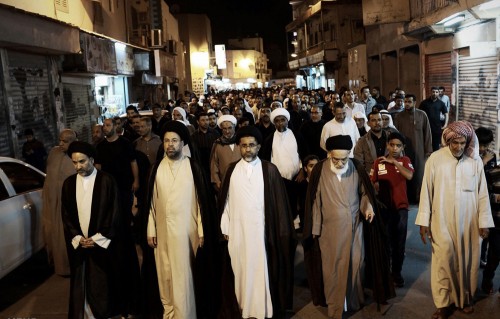Since 2011, Bahraini officials have violently repressed activists and opposition political societies. Police used excessive force to disperse peaceful protesters demanding political reform in the Manama Pearl Roundabout. To further immobilize pro-democracy initiatives, Bahraini forces have arrested human rights defenders and amended laws to criminalize civil society and silence dissenting voices. Most recently, the government altered existing legislation on political societies to ban religious figures from engaging in political affairs.
In 2005, the Bahraini government passed the Political Society Law, which regulates political and civil activity in the public sphere. Initially, the law “banned political societies from using religious tribunes to promote their ideas, objectives or programmes.” But, on 22 May 2016 the authorities amended Article 5 to specifically prohibit religious figures, such as clerics and imams, from political participation. The amendment forbids religious figures from discussing politics during sermons and other assemblies, among other restrictions.
Though the law ostensibly bars all religious figures from political engagement, the government has consistently and disproportionately used such authority to target the political activities of the country’s Shia majority. Although Article 18 of the Bahraini constitution protects the rights of citizens and guarantees equal treatment regardless of religious affiliation, the al-Khalifa monarchy has long marginalized the Shia population, depriving many communities of sufficient access to healthcare, education, and employment. In recent years, the Bahraini government has targeted Shia leaders and religious figures for prosecution related to their political activity and denaturalized dozens of members of the Shia community. Loss of citizenship leaves individuals particularly vulnerable, as they are rendered stateless with no legal rights or due process. On 20 June 2016, Bahraini officials announced that they had revoked the citizenship of Ayatollah Sheikh Isa Qassim, one of the country’s most prominent Shia religious leaders and an outspoken critic of the government. Bahrain’s interior ministry justified the decision by arguing that Sheikh Qassim had embedded political sentiments in his religious sermons. Days before that, the Bahraini government suspended the Al-Wefaq National Islamic Society, the country’s largest political society and the leading Shia opposition group.
The government’s initiatives to bar religious figures from engaging in political speech undermine the diversity and legitimacy of the country’s political sphere, which has been dominated by government supporters since the opposition societies boycotted the 2014 election. Even before – and still after – the boycott, ADHRB has found that the government’s regular use of political engineering ensured the underrepresentation of the Shia population in the nation’s only elected body. Moreover, the suspension of the opposition organization Al-Wefaq further alienates the Shia population from active involvement in politics.
The Political Society Law represents just one part of a growing network of legislation used to strategically marginalize Bahrain’s Shia population and/or criminalize the free development of civil society. Political participation should not be dependent on religion, gender, or any other feature or affiliation. The international community must call on the Bahraini government to provide equal opportunities for all members of society. Silence from world powers, such as the United States and the United Kingdom, lends false legitimacy to the Bahraini government’s intensified repression of the pro-democracy movement and the country’s Shia community.
Reim Alian is an Advocacy Intern at ADHRB.





